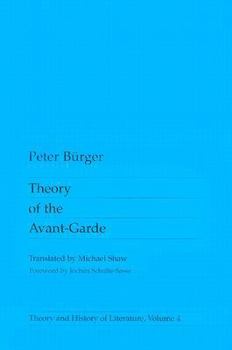Theory of the Avant-Garde: Volume 4
Select Format
Select Condition 
Book Overview
Suggests a theory of art, tests against the French and German avant-garde movements of the twenties, and discusses hermeneutics, ideology, aesthetic categories, and the autonomy of art."
Format:Paperback
Language:English
ISBN:0816610681
ISBN13:9780816610686
Release Date:September 1984
Publisher:University of Minnesota Press
Length:192 Pages
Weight:0.61 lbs.
Dimensions:0.4" x 5.9" x 9.0"
Customer Reviews
2 ratings
Dialectical Aesthetic Theory.
Published by Thriftbooks.com User , 15 years ago
Theory of the Avant-Garde is probably the best book on aesthetics I've ever read. Burger argues that aesthetic theory has previously neglected to deal with art as an institution in bourgeois society. Unlike medieval works, art under capitalism is relatively autonomous from various social institutions. While sacral art was integrated into the church, and courtly art into the court, art under capitalism develops into its own sphere, to be judged exclusively by aesthetic criteria. At the same time, art is separate from the praxis of life; its value consists precisely in its ability to take one away from everyday experience. Drawing from Marcuse's classic essay "On the Affirmative Character of Culture," Burger argues that art's aesthetic unity combined with its autonomy from the praxis of life serve to negate the political engagement of any individual work. This palliative effect in turn exposes the partiality of autonomous art; its autonomy actually serves a deep structural function of a cultural anodyne. The avant-garde comes in as the first moment that artists became self-conscious of the effects of art's autonomy and sought to destroy it. Burger uses a Hegelian-Marxist framework (although he is sensitive to teh Althusserian critique) to argue that the avant-garde constituted the moment of self-criticism of the institution of art which revealed the truth of the institution's past, just as Marx's self-criticism of bourgeois society produced historical materialism, making possible a generalized science of history. This summary only scratches the surface of Burger's 100 page essay. In developing this central argument, he has fascinating arguments regarding Benjamin, Adorno, Lukacs and Brecht, and thought-provoking readings of various avant-gardiste techniques. I'd venture to say there are few books triple the length of this one that contain the same amount of careful, creative, and exciting writing.
Modernism vs the Avant-Garde
Published by Thriftbooks.com User , 22 years ago
This book argues a clear difference between two often confused terms: Modernism and the Avant-Garde. According to Peter Burger, Modernism dealt with formal evolution of style (in visual arts as well as in literature), while the Avant-Garde project involved radical change of the way of life. Consequently,the greatest Modernist movements of the 20th century, according to Burger, must be Cubism and Abstractionism, as they were mainly about visual distortion, and the relevant masters were Picasso and Kandinsky. On the other hand, the Avant-Garde produced its own most ambitious projects with the Russian Constructivism and Surrealism, and its geniuses must be Tatlin, Rodchenko, or Marcel Duchamp. All this is argued quite intellegently; the only reason for my 4 stars instead of 5 being that Burger brings on too much polemics with Marxist or semi-Marxist theorists (Lukacs, Adorno, etc.) and his own view is sometimes hard to disentangle from what he criticizes.






